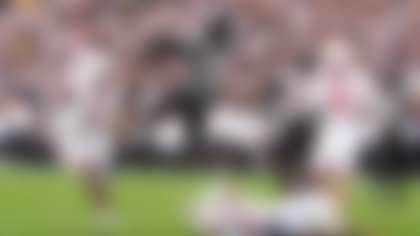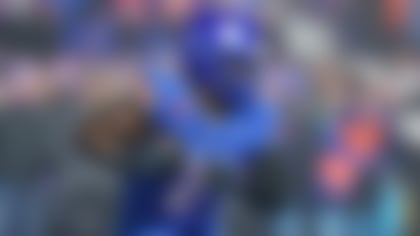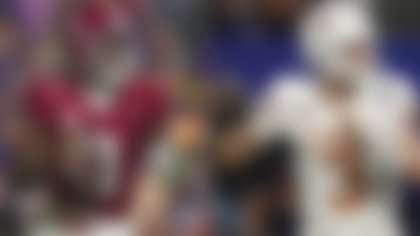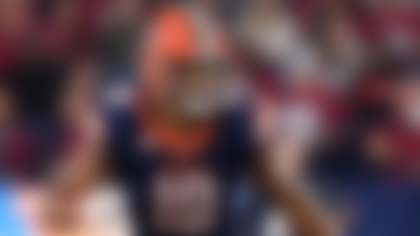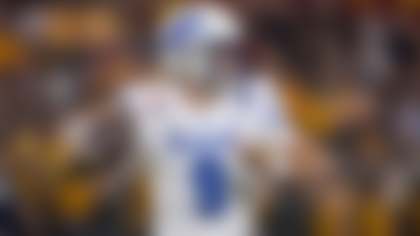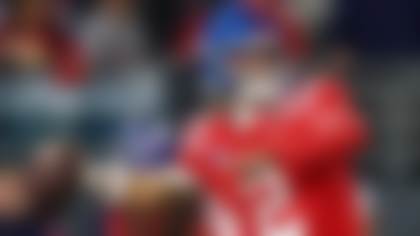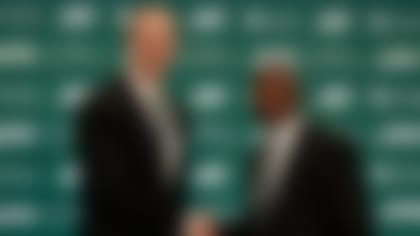The 49ers deserve high marks for what they did in the 2020 NFL Draft, acquiring two potential starters in the first round and adding a third starter via their trade for veteran offensive tackle Trent Williams. So, yes, give them an "A" grade and post the clapping-hands emoji on social media. But one thing you should not do is act as if the team is demonstrably better than it was last season, when it advanced to Super Bowl LIV.
That's not a knock against what they've done; it's simply to point out that each of their key moves was basically an attempt to fill holes created by the departure of other players. They selected defensive tackle Javon Kinlaw 14th overall to replace 2019 club MVP and second-team All-Pro DeForest Buckner, who was traded because the cost of signing him to a top-of-the-market extension would hinder their ability to re-sign other players. Wideout Brandon Aiyuk was taken 25th overall to succeed Emmanuel Sanders, who left for more money in free agency. And Williams, who hasn't played since 2018, was acquired to take over for Joe Staley, who is retiring.
As astute as the additions appear to be, it's doubtful any of them represents an upgrade this year over what the team had last season. That's not to say the 49ers won't be better down the road -- only time will tell -- but if you don't replace talent with equal or superior talent, it's disingenuous to claim they are improved right now.
"We felt strongly that perhaps we had the best roster in football last year, and I'm proud of our group to be able to keep intact as much of it as we did," general manager John Lynch said by phone late Saturday afternoon. "Would we have liked to keep Buckner and Sanders, absolutely. But that has been our biggest dilemma: How do you make this roster better knowing we were getting to a new economic reality? This was the first year you can't just go to the grocery store and say, 'I want this. I want this. I want this.' This time it was, 'I can get this, but I have to put this back.' "
Team-builders must do a delicate dance when trying to win now while building for later. The more talented the roster, the more players want and deserve to be paid. But everyone can't get top dollar. By declining to pay Buckner an average of $21 million a year, which is what he received in an extension from Indianapolis, the Niners were able to re-sign fellow D-lineman Arik Armstead and use the pick they received from the Colts to help land Kinlaw. No issues there.
But while the moves might help them be better in 2021, 2022 and beyond, it's hard to see them making the club better this season. Let's look at each of the key moves, examining the thinking behind them and the potential net impact.
1) Trading DeForest Buckner
Buckner was arguably their best defensive lineman, a dependable and impactful player who made those around him better. However, trading him a year before he was scheduled to cash in as a free agent upon the expiration of his rookie deal allowed the 49ers to get three players for the price of one. They re-signed Armstead (whose own rookie contract had run out) for an average of $17 million a year, drafted Kinlaw (after trading down from the slot they landed from the Colts, No. 13, to No. 14 in a swap with the Bucs) and had enough cap flexibility to re-sign safety Jimmie Ward. Had they kept Buckner, they likely would have none of the three and most definitely would not have Armstead and Kinlaw. Perhaps they might not even have Aiyuk; the package San Francisco used to move up from No. 31 to No. 25 for the receiver included a fourth-rounder acquired from Tampa when the Niners traded down from 13 to 14.
2) Letting Emmanuel Sanders go
The Niners needed another perimeter playmaker during their Super Bowl run last season and acquired Sanders from the Broncos at the trade deadline. He gave them everything they wanted and was in position to make a Super Bowl-clinching touchdown catch, had Jimmy Garoppolo not overthrown him so badly late in the fourth quarter.
But the Niners were not willing to approach the $16 million, two-year deal that the 33-year-old Sanders signed with the Saints, despite needing more impact at the position. This was considered one of the deeper receiver drafts in recent memories, and the team believed it could land an impact performer to replace the veteran. Coach Kyle Shanahan believes Aiyuk can be that guy and said he had him rated No. 1 among the wideouts. But here's the deal: Personnel people will tell you that the transition from college to pro historically takes time for receivers. The 49ers know the good and the bad of this; they got solid production from Deebo Samuel after taking him in the second round last season, but they soured a year ago on Dante Pettis, whom they traded up to get in the second round in 2018.
3) Trading for Trent Williams
Staley was a stalwart from the moment the team used a first-round pick on him in 2007, starting all 16 games as a rookie and every other game he appeared in from that point forward. But Staley began to break down physically in a major way last season, resulting in his retirement. Williams, who was a seven-time Pro Bowler with Washington, should fill the void capably, but he's a bit of an unknown from the standpoint that he did not play last season because of personal issues with that franchise. When he did return, after sitting out the entire offseason and roughly half the season, he was placed on injured reserve.
The desire to build with one eye on the present and the other on the future is a requirement for any general manager, particularly when weighing the known vs. the unknown when it comes to proven pros vs. promising prospects. But the window in which teams have the opportunity to legitimately chase championships doesn't stay open for long, even for talented young teams -- something the 49ers know as well as anyone, managing only one winning season in the six years that immediately followed their Super Bowl appearance in 2012.
Similar to then, many of their starters are back from a squad that bullied Minnesota and Green Bay in the NFC playoffs, beating each by 17 points to reach the Super Bowl. Is that enough to make a return trip to the title game -- and take that final step after squandering a 10-point lead in the final 6-plus minutes of a 31-20 loss to the Chiefs -- if their youngsters take the next step in their development? Possibly.
But it's also true that every season is unique to itself. Some players take a step forward and others take a step back. Injuries are also a factor. Just one year ago, coming off a loss in the Super Bowl, the Rams thought their window was wide open because of the young talent on their roster. A lot has changed for them since then. Ditto the Falcons and Panthers in recent years.
Fact is, others have upgraded within the conference. Most notable are the Bucs, who -- with a talented young roster already in place -- added six-time Super Bowl-winning QB Tom Brady and his longtime sidekick, tight end Rob Gronkowski. Whether they or another NFC team has improved enough to overtake San Francisco will be decided on the field, but at this point, there's no way to say categorically San Francisco is better than it was a year ago.
"We're encouraged," Lynch said. "I think with another year in our system, players are going to improve. I think we have an opportunity to be better. Each year is a new year, but I'm actually very pleased there wasn't more turnover. The economic reality is, we have to leave room for other guys as they come along, like (All-Pro tight end George) Kittle. (Kittle is entering the final year of his rookie contract.) Looking at the whole picture, I think we did a good job of giving us an opportunity to be better."
Follow Jim Trotter on Twitter _@JimTrotterNFL_.


